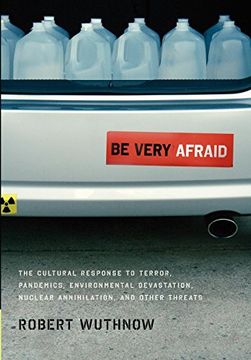Compartir
Be Very Afraid: The Cultural Response to Terror, Pandemics, Environmental Devastation, Nuclear Annihilation, and Other Threats (en Inglés)
Robert Wuthnow (Autor)
·
Oxford University Press
· Tapa Dura
Be Very Afraid: The Cultural Response to Terror, Pandemics, Environmental Devastation, Nuclear Annihilation, and Other Threats (en Inglés) - Robert Wuthnow
$ 113.574
$ 141.967
Ahorras: $ 28.393
Elige la lista en la que quieres agregar tu producto o crea una nueva lista
✓ Producto agregado correctamente a la lista de deseos.
Ir a Mis Listas
Origen: Estados Unidos
(Costos de importación incluídos en el precio)
Se enviará desde nuestra bodega entre el
Lunes 17 de Junio y el
Lunes 01 de Julio.
Lo recibirás en cualquier lugar de Argentina entre 1 y 3 días hábiles luego del envío.
Reseña del libro "Be Very Afraid: The Cultural Response to Terror, Pandemics, Environmental Devastation, Nuclear Annihilation, and Other Threats (en Inglés)"
Robert Wuthnow has been praised as one of "the country's best social scientists" by columnist David Brooks, who hails his writing as "tremendously valuable." The New York Times calls him "temperate, balanced, compassionate," adding, "one can't but admire Mr. Wuthnow's views." A leading authority on religion, he now addresses one of the most profound subjects: the end of the world.In Be Very Afraid, Wuthnow examines the human response to existential threats--once a matter for theology, but now looming before us in multiple forms. Nuclear weapons, pandemics, global warming: each threatens to destroy the planet, or at least to annihilate our species. Freud, he notes, famously taught that the standard psychological response to an overwhelming danger is denial. In fact, Wuthnow writes, the opposite is true: we seek ways of positively meeting the threat, of doing something--anything--even if it's wasteful and time-consuming. The atomic era that began with the bombing of Hiroshima sparked a flurry of activity, ranging from duck-and-cover drills, basement bomb shelters, and marches for a nuclear freeze. All were arguably ineffectual, yet each sprang from an innate desire to take action. It would be one thing if our responses were merely pointless, Wuthnow observes, but they can actually be harmful. Both the public and policymakers tend to model reactions to grave threats on how we met previous ones. The response to the terrorist attacks of 9/11, for example, echoed the Cold War--citizens went out to buy duct tape, mimicking 1950s-era civil defense measures, and the administration launched two costly conflicts overseas. Offering insight into our responses to everything from An Inconvenient Truth to the bird and swine flu epidemics, Robert Wuthnow provides a profound new understanding of the human reaction to existential vulnerability.

